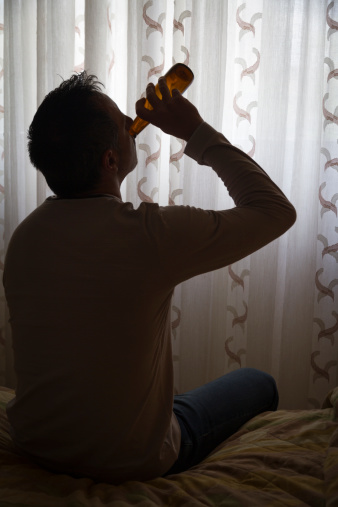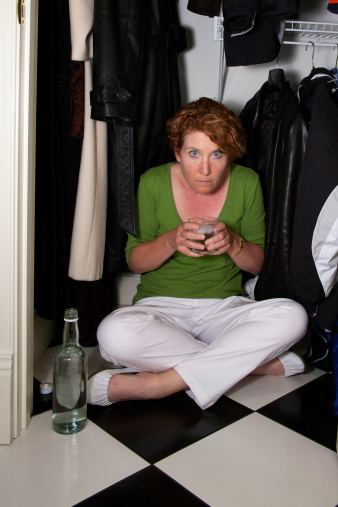
Alcoholism can be insidious in how it affects not only the life of the alcoholic but the lives of their friends and family. Sometimes an alcoholic can be high-functioning for years without anyone realizing just how pervasive their illness has become. Not only because they may be actively hiding their addiction, but also because even now, much of the American populace remains somewhat unknowledgeable of the dangers and mental and physical signs of alcoholism. If you notice that you’re struggling with drinking or have a loved one who is, compare your symptoms to the signs listed below.
Alcoholism in America
According to research, nearly 54.3 percent (or 18.3 million people) of people in 2019 in the United States aged 18 to 25 were past month alcohol users in 2019. 1 The Centers for Disease Control and Prevention (CDC) estimates that one in 10 deaths among working-age adults (ages 20-64) are due to excessive alcohol use, calling it the leading cause of preventable death in the United States.2
The agency estimated that excessive alcohol use shortened the lives of those who died by approximately 30 years, with alcohol abusers suffering from diseases such as breast cancer, liver disease, and heart disease.
As horrifying as those numbers may appear, they only scratch the surface of the true toll of alcoholism. Alcohol abuse and addiction impact spouses, friends, children, and other family members of alcoholics in multiple ways. It is estimated that each alcoholic affects an average of four people, meaning there are 92 million Americans currently being affected by alcoholism in some way.3
Understanding Alcoholic Behavior

Perhaps the most difficult thing for a non-alcoholic to understand is why an alcoholic can’t stop drinking. In many cases, the damage done to the life of the alcoholic and his or her family is so obvious and plain to see that it can be tough to comprehend why they would continue to drink. Additionally, for those who don’t understand the nature of addiction, this can seem to be as simple as making a choice.
The problem is that alcoholism is a chronic and progressive disease, not a conscious choice. There are numerous potential contributing factors, including mental health, family history, trauma, and others, that make a person more predisposed to alcohol abuse and addiction than others.
Oftentimes, this chronic disease stems from binge drinking and social drinking, which are often underestimated for their dangers. If it were as simple as just deciding to stop, alcoholism wouldn’t be plaguing millions of U.S. adults and countless others around the world.
While the first step in defeating alcoholism does begin with a decision, it also requires psychological counseling, addiction education, a reformation of habits, a change of environment, and much more.
Social, Psychological, and Physical Signs of Alcoholism
Mental Effects of Alcohol
Unfortunately, due to pregnant women consuming alcohol while carrying, over 5,000 babies per year are born with fetal alcohol syndrome (FAS).4 This is a disease that causes children to be born with irreversible physical and mental defects. Children suffering from FAS may grow up with facial deformities and mental retardation that prevents them from leading a normal life. It can also cause hyperactivity, learning difficulties, and problems with memory and judgment.
Long-term alcohol abuse can also impact the brain’s natural ability to chemically balance itself. Drinking impacts levels of the inhibitory neurotransmitter known as GABA, which leads to sedation and drowsiness. Over time, a person who’s addicted to alcohol may struggle with mental illness due to a chemical imbalance.
Familial and Social Impact of Alcohol
Additionally, while birth defects caused by alcohol abuse are troubling, the social impact of a child having an alcoholic parent or a spouse having an alcoholic husband or wife can be just as devastating. It is estimated that each alcoholic affects an average of four people, meaning there are 92 million Americans currently being affected by alcoholism in some way.
There are many ways that alcohol destroys families:
- Financial Strain: It is not cheap to fund the habits of an alcoholic. This is especially true for families without a large income. Combine that with the high risk of an alcoholic losing his or her job and the financial impact on a family, it can be difficult to ignore.
- Low-Self Esteem, Depression, and Guilt: Children of alcoholics have been reported to suffer from feelings of guilt, fear of abandonment, chronic depression, and high levels of anxiety. Many children blame themselves for their parents’ drinking. They are less likely to establish healthy relationships or to attend college. Additionally, they are more likely to become alcoholics themselves.5
- Codependency: Spouses of alcoholics often bear the brunt of the disorder. Marriages involving an alcoholic may suffer from a lack of communication or intimacy. Additionally, there is a chance for the spouse to become codependent, a mental disorder in which one spouse enables the addicted spouse and puts their needs ahead of their own.
Physical Signs of Alcohol Abuse
Part of the problem is that drinking and being drunk are often considered socially acceptable and not problematic. If a person were to show up to a party high on drugs, it would likely be met with derision, anger, or concern. However, if that same person gets hopelessly drunk at the same party, those actions would almost certainly be viewed differently.
There is also the issue of privacy. A friend or family member witnessing someone they love doing illicit drugs may feel inclined to step in and say something immediately. However, when it comes to drinking alcohol, its legality clouds the situation. Combine that with an alcoholic’s tendency to hide or lie about how much they drink, and it is easy to see why people go on for years as alcoholics without anyone realizing it.
Some of the most common symptoms and signs of being addicted to alcohol are:
- Neglecting responsibilities to drink
- Use of alcohol in inappropriate or dangerous situations
- Mixing alcohol with prescription medication
- Being arrested for DUIs or public drunkenness
- Using alcohol as a relaxation or stress aid
- Avoiding family or friends to drink
- Unwillingness to stop drinking, even for a short period
- Uncharacteristic changes in behavior
- Excessive tiredness
- Sudden onset of depression
- Intestinal trouble
- Heart failure
- Liver trouble
The person’s face, skin, and even eyes may also appear different when they struggle with alcohol abuse. Some common bodily and facial signs of alcoholism include:
- Extreme weight gain or loss
- Disheveled appearance
- Tired eyes
- Lack of personal hygiene
- Redness in the face, especially in the nose and cheeks
- Repeated infections and skin sores (abscesses)
- Bruises and injuries (from falling when blacking out)
- Yellow skin tone
- Yellowing in the whites of the eyes
- Withdrawal symptoms like tremors, sweating, nausea, vomiting, unsteadiness, and seizures
Call Our Lake Worth Alcohol Rehab Today
Do you have a loved one who is preoccupied with abusing alcohol? Does your loved one go to great lengths to hide their drinking? Do discussions about their alcohol abuse deteriorate into arguments?
Do you see your loved ones drunk more often than they are sober? Has alcohol abuse led to a decline in quality of life, loss of financial stability, lack of intimacy, or an inability for them to function regularly?
If you answered yes to one or multiple questions, your loved one might have a substance abuse disorder that requires immediate alcoholism treatment. Our Lake Worth, FL, drug rehab can help coordinate intervention to help them willingly accept treatment and begin changing their life.
Call BHOPB today at 561-220-3981 to speak to one of our representatives and get more information about our addiction treatment in Lake Worth.
Source:
Related Reading:



